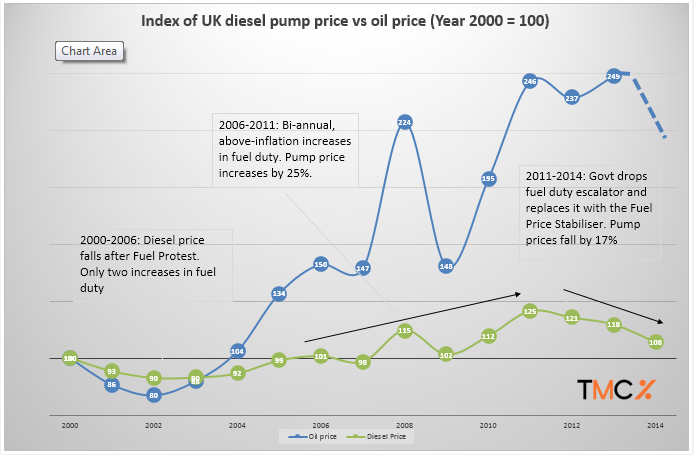8 December 2014. The Miles Consultancy, is warning that the fall in oil prices could lead the Government to create a fuel tax trap for road users.
Although yesterday’s Autumn Statement ruled out a fuel duty increase before next May’s general election, the stage is set for a return to above-inflation tax rises later next year. Oil prices last week fell below the $75 per barrel benchmark that opens the door for a return to above-inflation increases in fuel duty under the Fuel Price Stabiliser regime introduced by the Government in 2011.
Paul Jackson, managing director of TMC, said: ‘Reviving the duty escalator would be a huge gamble by the next government. It would be a bet on oil prices staying low, thus offsetting the negative impact of higher tax on economic growth. But global oil supply remains precarious despite the current boost given to US domestic production from fracking. Even a modest uptick in world demand for oil will send the price back up again very quickly. Raising fuel duty would hit fleets with a double-whammy.’
TMC, whose integrated fuel card and audited mileage capture solutions can reduce fuel and mileage expenses by up to 25%, is urging fleets to capitalise on falling fuel prices by focusing on efficiency and productivity.
‘The reason for lower oil prices is not a glut of new crude,’ said Paul Jackson. ‘It’s because major consumers like fleets are much smarter at using in-depth information on vehicles and drivers to get the most out of every litre of business fuel.’
Analysis of price trends by TMC shows that regardless of crude oil prices, pain at the pump is primarily influenced by tax decisions.
TMC’s analysis shows that UK pump prices started falling in real terms in 2011, when the Government abandoned the fuel duty escalator. Starting in 2006, the Fuel Duty Escalator pushed pump prices 25% higher in real terms than the level which sparked nationwide fuel protests in 2000. Since the Government abandoned the escalator in 2011, however, the real price of diesel has dropped by 17% despite oil prices remaining at all-time record highs until the second half of this year.
Notes
TMC’s analysis is based on data from the US Energy Information Administration (crude oil prices) and UK national statistics (diesel price and RPI). The data series are indexed to average annual prices in 2000 and prices are in constant 2013 GBP adjusted for exchange rate fluctuations in the case of oil prices. Note that the nominal daily record price for crude oil, $147 per barrel, occurred in 2008 but the annual average price of Brent crude that year was $97 whereas it stayed around $110 in 2011-13.
It should also be noted that 2000, the baseline of the index, was itself an historic high point in UK fuel prices due to the first fuel duty escalator, which was abandoned that year after nationwide protests by road users. The second fuel duty escalator increased duty by 25%, from 47.1 pence per litre on 1 December 2006 to 58.95 pence per litre on 1 January 2011. The escalator was dropped in March 2011 and duty was cut by 1.7%. It was replaced with the Fuel Price Stabiliser mechanism under which above-inflation increases in duty would only be brought back if the price of crude oil fell below $75, as it did on 27 November 2014.


